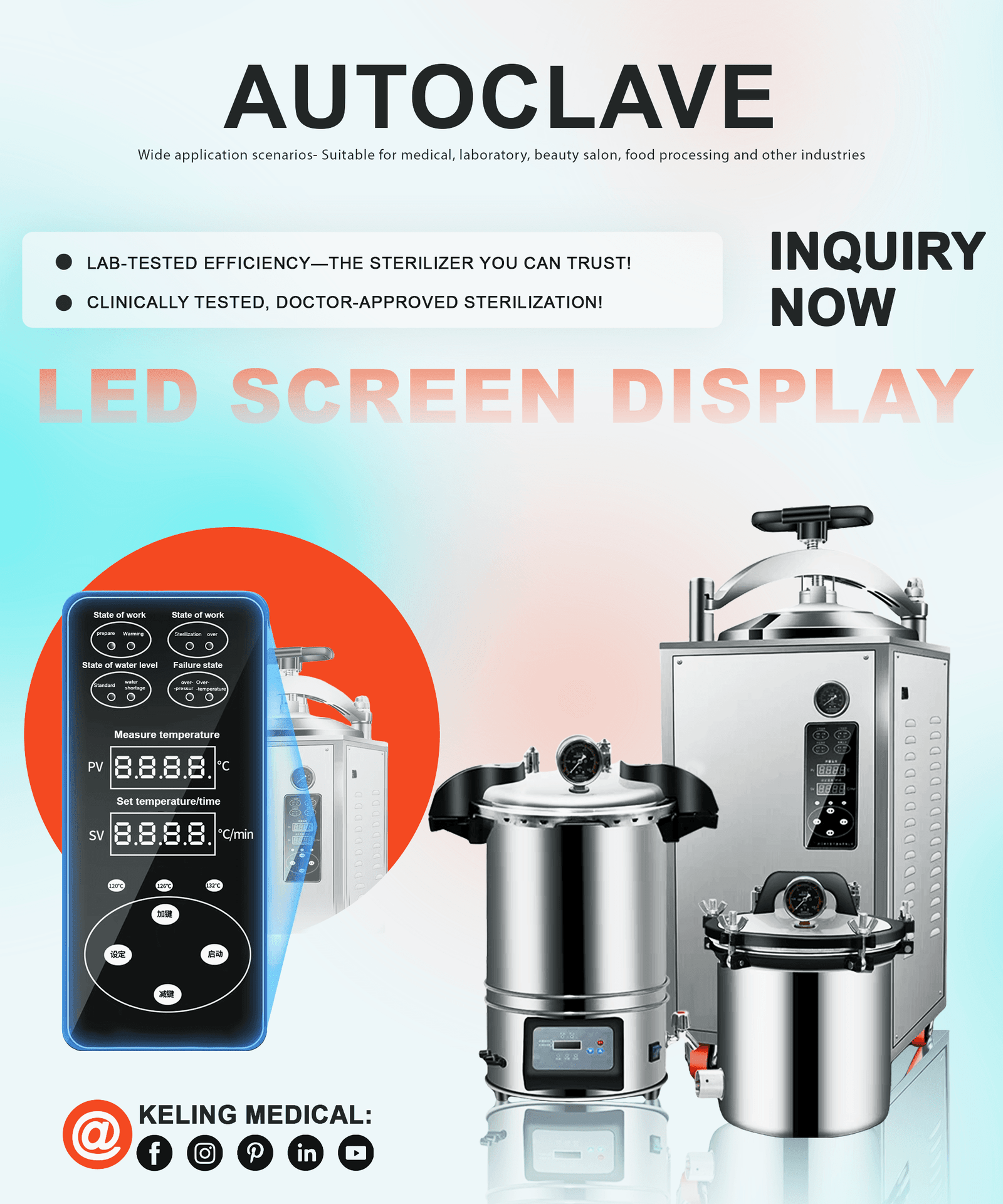
What does an autoclave do and why is it critical for sterilizing nail tools? This article examines autoclaves in nail salons by explaining their operation and reasoning behind their status as the top choice for sterilization. Our guidance helps you select the best autoclave suitable for your specific requirements.
Autoclaves serve as specialized machines that use high-pressure steam to sterilize equipment and tools. Medical and dental industries along with beauty services such as nail salons use autoclaves to destroy bacteria, viruses, fungi, and spores from tools that must be reused.
The sterilization process in an autoclave involves:
High-Pressure Steam: The autoclave creates steam under high pressure which reaches temperatures between 121°C and 134°C for sterilization.
Exposure Time: The duration of steam exposure ensures complete destruction of all microorganisms on tools.
Drying Phase: The autoclave removes moisture from the tools during the drying phase which completes sterilization and prepares the tools for use.
Autoclaves provide the most dependable sterilization method because their heat, pressure, and timing protocols effectively eliminate even the toughest microorganisms.
Nail tools that haven’t undergone proper sterilization processes introduce significant health risks.
Bacteria and fungi present on tools can lead to skin infections and nail fungus among other health problems.
Bloodborne pathogens including hepatitis B, hepatitis C, and HIV pose transmission risks through contaminated tools.
Poor hygiene practices in nail salons can result in negative customer reviews and the loss of clients.
Autoclaves provide numerous benefits when used to sterilize nail tools.
Comprehensive Sterilization: Autoclaves work to destroy all microbial life forms including tough spores which resist other cleaning techniques.
Compliance with Regulations: Health departments and regulatory bodies impose autoclave sterilization requirements for salons.
Customer Trust: Salons that maintain high hygiene standards and invest in professional sterilization machines gain more client trust.
Cost-Effective: The initial expense for autoclaves appears substantial but their durability prevents expensive legal actions and hygiene-related fines.
Selecting the right autoclave for your nail salon requires attention to several important factors.
To select an autoclave for your nail salon you should evaluate the following criteria.
Pick an autoclave that will accommodate both the physical space of your salon and the quantity of tools that require daily sterilization.
Smaller salons should use compact autoclave models while bigger operations need larger units for high-volume sterilization tasks.
Select an autoclave model that provides rapid sterilization to maximize workflow efficiency.
The autoclave includes user-friendly controls and automated features to simplify operation.
The integrated drying stage prepares tools for direct usage after sterilization.
Autoclave safety improves through continuous monitoring of pressure and temperature levels during operation.
The autoclave should have international sterilization accreditation such as ISO and CE certifications.
Verify that the equipment aligns with local health department requirements for nail salons.
Select an autoclave constructed from superior materials to achieve maximum durability.
Look for autoclave models that feature simple maintenance processes and replacement parts that can be easily obtained.
The purchase of an autoclave for your nail salon goes beyond hygiene requirements because it protects your clients and staff while safeguarding your business reputation. Selecting a dependable autoclave enables maximum safety and cleanliness which builds client trust and provides them peace of mind.
If you’re looking for high-quality autoclaves for your nail salon, Keling Medical offers a wide range of sterilization equipment tailored to your needs. Contact us today for more information:
Email: inquiry@shkeling.com
WhatsApp: +8618221822482
Website: https://autoclaveequipment.com/
An autoclave uses high-pressure steam to kill all microorganisms, including bacteria, viruses, fungi, and spores. Unlike chemical disinfectants or UV sterilizers, autoclaves provide comprehensive sterilization, ensuring the highest level of hygiene.
Nail tools should be sterilized after every use to prevent cross-contamination and maintain hygiene standards.
Most metal tools can be safely sterilized in an autoclave. However, tools made of plastic or other heat-sensitive materials may not be suitable. Always check the manufacturer’s guidelines.
The duration of an autoclave cycle depends on the model and settings. On average, a complete cycle, including drying, takes 15–30 minutes.
Regular maintenance includes cleaning the chamber, checking seals and gaskets, and ensuring proper water levels. Refer to the user manual for specific maintenance instructions.
For more information or to find the perfect autoclave for your needs, don’t hesitate to contact Keling Medical:
Email: inquiry@shkeling.com
WhatsApp: +8618221822482
Website: https://autoclaveequipment.com/

The autoclaving process serves as an essential sterilization practice utilized across medical, laboratory, and research facilities to protect glassware and instruments through effective sterilization. High-pressure steam eliminates pathogens during this

The autoclaving process serves as an essential sterilization practice utilized across medical, laboratory, and research facilities to protect glassware and instruments through effective sterilization. High-pressure steam eliminates pathogens during this
The autoclaving process serves as an essential sterilization practice utilized across medical, laboratory, and research facilities to protect glassware and instruments through effective sterilization. High-pressure steam eliminates pathogens during this
The autoclaving process serves as an essential sterilization practice utilized across medical, laboratory, and research facilities to protect glassware and instruments through effective sterilization. High-pressure steam eliminates pathogens during this
The autoclaving process serves as an essential sterilization practice utilized across medical, laboratory, and research facilities to protect glassware and instruments through effective sterilization. High-pressure steam eliminates pathogens during this
The autoclaving process serves as an essential sterilization practice utilized across medical, laboratory, and research facilities to protect glassware and instruments through effective sterilization. High-pressure steam eliminates pathogens during this